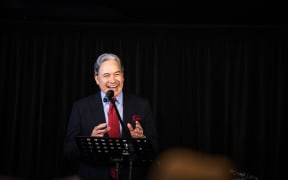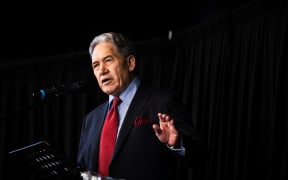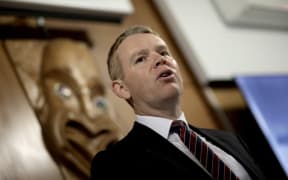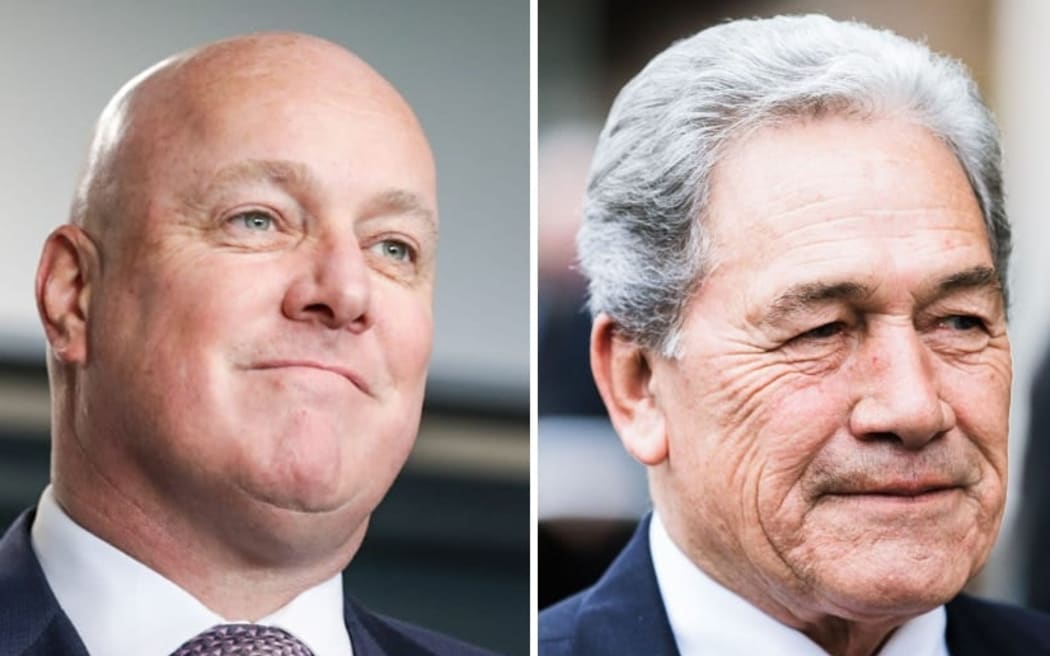
Christopher Luxon says if he has to call Winston Peters to get numbers for a majority, he will. Photo: RNZ
Analysis - Christopher Luxon's announcement that he'll work with Winston Peters after the election if he has to boosts NZ First's chances of getting back into Parliament; the latest polls show a three-way coalition is a likely outcome; and Chris Hipkins comes blasting back in the second leaders' debate.
National leader Christopher Luxon's announcement on Monday that he would work with NZ First after the election, if he had to, changed the dynamics of the campaign.
Winston Peters' supporters now know that if he gets back in he'll very likely be part of the next government, and two polls this week showed NZ First over the 5 percent threshold.
That will give confidence to those thinking about backing NZ First that their vote won't be wasted.
Luxon made it clear in his announcement that he doesn't want NZ First back. His preference, he said, was a stable National/ACT government but if he had to call Peters to get the numbers for a majority, he would.
That has been obvious for weeks but it needed to be out there for it to be real, and now it is.
The Herald's Audrey Young, who has seen a few elections, said the conditionality of Luxon's position - that he would call Peters only if he had to - would be lost on a lot of people who absorbed news in headlines.
"Some will see it as a de facto endorsement of NZ First - which may be why Luxon avoided for so long making such a statement," she said.
"The one certainty is that by having said he was open to working with Winston Peters, if required, he has increased the likelihood that NZ First will be back in Parliament and will have enough leverage to be part of the next government."
Peter Dunne, the former party leader who was an MP for 33 years, saw trouble ahead for Luxon if he does need NZ First.
"His implication is that NZ First will be called on only if needed to bolster National and ACT," Dunne said in an article published by Stuff.
"However, NZ First does not work that way. It has always sought to be centre-stage in government formation negotiations."
Dunne said Luxon's announcement revived "the spectre of past negotiations" and also NZ First's conduct in government.
After going over NZ First's record in government, Dunne said the blunt reality was that governments which tried to work with the party did not last.
"All of which makes Luxon's announcement so perplexing. He seems to be suggesting he can succeed where others have failed," Dunne said.
"By stating he will do 'whatever it takes' to get rid of the current government, he has left the door open for NZ First to be just as obstinate and destructive as before, with a similar likely outcome."
In his announcement, Luxon did his best to persuade people who wanted a National-led government to vote for National, not anyone else.
He also suggested Peters couldn't be trusted, and could even go with Labour despite the NZ First leader's numerous statements that he won't, and Chris Hipkins vowing that Labour won't have anything to do with him.
"We all remember 2017. New Zealand First hasn't gone with National for 27 years and could choose Labour again," Luxon said.
What he didn't mention was that before the 2008 and 2011 elections, John Key ruled out working with NZ First. In the 2008 election NZ First didn't reach the threshold and was out of Parliament.
Key's stance was considered to have been one of the reasons for that, because it meant no one who wanted a National-led government was likely to vote for NZ First.
That had been Key's intention and Peters doesn't forget. The next time he had the opportunity to be kingmaker, after the 2017 election, he went with Labour and Jacinda Ardern was able to form a government.
The first poll out this week was Newshub-Reid Research, and it threw up some surprising results.
Labour was down 0.3 of a point to 26.5 percent, not so surprising, but the Greens gained nearly two points to reach 14.2 percent. Those figures would give Labour 33 seats and the Greens 18 - more than half Labour's number, which would be huge for a minor party.
National was down 1.8 points to 39.1 percent (49 seats) and ACT lost 1.3 points to 8.8 percent (11 seats).
That gave National/ACT 60 seats, one shy of a majority, and NZ First on 5.2 percent was again holding the balance with six seats.
"The kingmaker crown is sitting atop his head once more," Newshub said of Winston Peters.
The second poll, 1News-Veriant, also showed National and ACT would need NZ First's support to form a government.
That was a shift from the previous week's poll when the two could have formed a coalition without needing Winston Peters, RNZ reported.
NZ First and the Greens were the only parties on the rise - a result which was the same as shown in the Newshub-Reid Research poll.
No recent poll has shown a Labour/Greens/Te Pati Māori combination holding enough seats to form a government, and unless there's a dramatic change between now and 14 October the election is going to be about whether or not National and ACT have enough seats to go it alone or Luxon has to make that call to Peters.
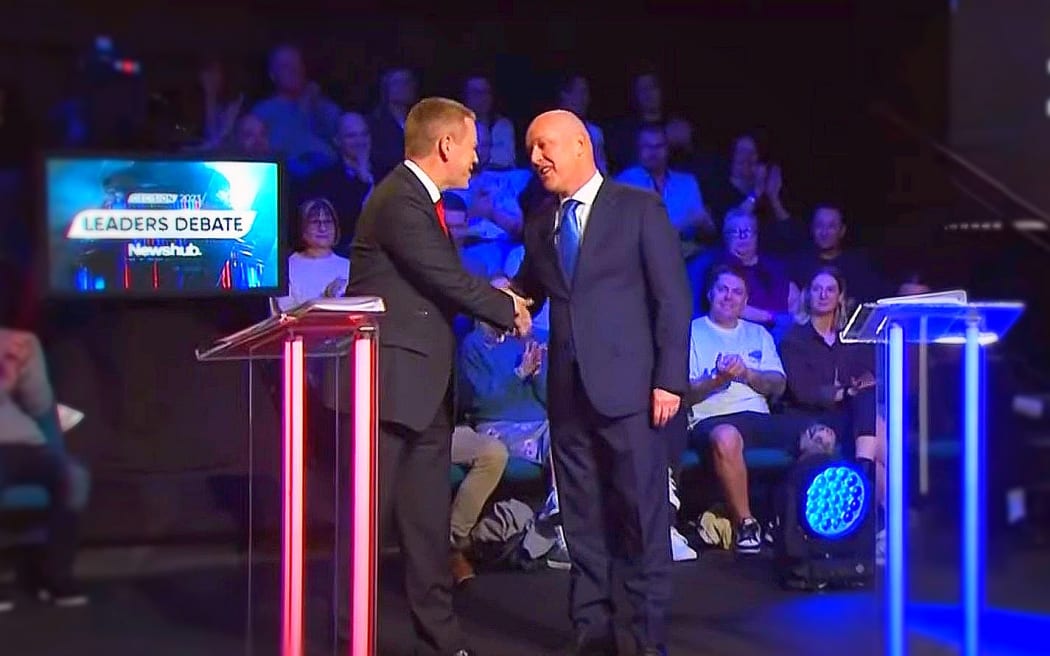
Newshub's first Hipkins vs Luxon debate. Photo:
The second leaders' debate, broadcast by Newshub on Wednesday night, would have been gratifying for Labour supporters. Hipkins came roaring back after his limp performance in the first debate and was generally considered to have won it.
The Herald's four judges gave it to Hipkins.
"Hipkins was ruthless in pushing home uncertainty about National's cuts programme, its costings, and exposing Luxon for dodging away from questions," political editor Claire Trevett said.
"The debate did serve to highlight once again all the questions that Luxon is not willing to answer."
Editor at large Shayne Currie said Luxon was no slouch but was weakest on questions around Peters.
Moderator Patrick Gower trapped Luxon by asking both leaders to say whether Peters was good or bad for the country.
Easy for Hipkins, who replied "bad".
Luxon clearly couldn't say that about the man he might have to include in his government, and tried to get out of it by saying "I don't know him, Paddy".
"Everybody knows him," Gower shot back. The audience loved that one.
Stuff's Tova O'Brien said Hipkins had a retort for literally every comment Luxon made in the debate.
"After a couple of small stumbles out of the blocks… Chris Hipkins dug deep and let rip," she said.
RNZ reported Hipkins brought fire he seems to be missing in the first debate, constantly challenging Luxon to answer questions more fully.
"Luxon seemed a bit thrown thrown off at times, but largely tried to play the more serious statesman," the report said.
"It was the details, digging into their policies, and a number of new commitments in some unexpected areas which really grabbed attention though."
In a separate report, RNZ listed the commitments made during the debate.
Both said they would make pay equal for nurses working at hospitals and GP clinics.
Both were pressed on whether they would lower the bowel cancer screening age. Luxon said it made sense to do so and he would match the age in Australia which is 50.
Hipkins said he was "absolutely" committed to lowering the age but was not pushed on a specific age.
Both committed to having more police than gang members and both committed to meeting the target of getting 80,000 children out of poverty by 2028.
During the debate Hipkins ambushed Luxon by reading a quote he attributed to a NZ First candidate, referring to Māori: "Cry if you want to, we don't care. You pushed it too far. We are the party with the cultural mandate and the courage to cut out your disease and bury you permanently."
Hipkins didn't explain further but asked Luxon why National was prepared to work with "those people".
Luxon said he thought the comments were racist and unacceptable.
This event generated considerable publicity in the next few days.
The candidate was identified as Rob Ballantyne, who made the comments at a public meeting.
He said Hipkins had taken them out of context. He had been referring to the "Māori elite" and gave as an example Labour's Māori MPs.
Peters backed his candidate, saying in a statement "if the mainstream media had been reporting my speeches that have been packing halls for the last two years, they would know that Mr Ballantyne's comments about co-governance and the Māori elite come exactly from my speeches."
Among the policy announcements this week was one that will actually affect people.
National revealed what it called a traffic lights system for jobseeker beneficiaries which included tougher sanctions.
Social development and employment spokesperson Louise Upston described it in familiar centre-right terms - it was about helping people out of unemployment and hardship, giving them greater independence and opportunities.
It would make it "crystal clear to unemployed people receiving the Jobseeker benefit what their obligations are, and what consequences they will face if they refuse to do their bit".
The full details are in RNZ's report.
Basically, the traffic lights mean that at green a person is meeting their obligations to find work and there's no change to the benefit.
At orange there had been a breach or breaches of obligations to prepare for and find work, resulting in more regular check-ins and/or attendance at job workshops.
Red would mean there had been a third breach of obligations and the reaction would include benefit reduction or suspension, money management and mandatory community work experience.
Upston told Checkpoint one employer had told her a person showed up for an interview in their pyjamas.
"Their view was that person was not actively or seriously seeking a job with their business," Upston said.
"There are jobs available, and under National we want to ensure more people are in work."
On Morning Report Luxon said the vast majority of beneficiaries would be in the green zone and the new sanctions would only affect a small number of people.
Reaction was predictable. Labour said parties on the right seemed to be competing to see who could "beat down on beneficiaries" the most as they attempted to get votes.
"I think New Zealanders actually have a heart and understand the challenges some New Zealanders face," said social development spokesperson Carmel Sepuloni.
Beneficiary advocacy groups denounced the policy and the Greens said it was cruel.
Labour's most important policy this week was $1 billion of new funding for Pharmac over the next four years.
Hipkins said that would mean a total increase of 62 percent for the drug-buying agency since Labour came to office.
"Our funding boosts have meant Pharmac has made available 75 new listings and widened access to 137 treatments," he said.
*Peter Wilson is a life member of Parliament's press gallery, 22 years as NZPA's political editor and seven as parliamentary bureau chief for NZ Newswire.

